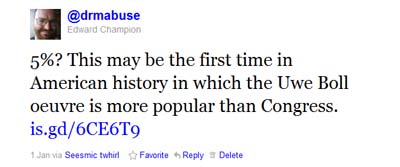Elliot Perlman appeared on The Bat Segundo Show #429. He is most recently the author of The Street Sweeper.
Listen: Play in new window | Download
Condition of Mr. Segundo: Collecting the dregs of his spatulate ambitions.
Author: Elliot Perlman
Subjects Discussed: Perlman living across the street from Memorial Sloan-Kettering Cancer Center, whether an author has to reside in a place to write about it, why some Australians consider the US and the UK to be part of the same neighborhood, how to make New York your friend, smoking outside of a hospital, the Mayor of East 77th and York, the improbable idea of characters in their thirties listening to Jonathan Schwartz, Kafka’s Statue of Liberty sword, rental rates and gentrification, writing an “anything you want” book that takes on such a wide social canvas, knowing the endings of Seven Types of Ambiguity and The Street Sweeper, how research enriches the writing process, whether a novelist can entirely avoid coincidences and convenient run-ins, being “a child of the 19th century,” It’s a Wonderful Life, cutting art from the past some appreciative slack, cynicism vs. efforts by fiction to feel and grapple with the world, sincerity and postmodernism, writing something you believe in, fiction interpreted as too didactic, Dietrich Bonhoeffer, how certain types of postmodernism masks sloppy thinking, conducting vigorous research and gravitating to the visceral, novelists as professional liars, the obligation to get serious historical details right, finding comfort in Auschwitz by going there six times, the ground beneath one’s feet as a starting point, “memory as a willful dog,” Daniel Schachter’s The Seven Sins of Memory, positive people who don’t learn from the past, avoiding Holocaust book fatigue, Godwin’s law, people who think they know about the Holocaust but really don’t, the Musselmann state, Auschwitz being half the size of Manhattan, Ricky Gervais sending up the Holocaust, Perlman’s family background, moral efforts to rid ourselves of superstitions, the American civil rights movement, the fictitious Henry Border vs. the real David Boder, the adjective-verb ratio, being inspired an episode of This American Life, whether it’s fair to speculate on what real historical figures are thinking, how to respect historical figures in fiction, interviewing Illinois psychiatrists and Boder’s students, the Voices of the Holocaust project, characters who steal objects as a narrative bookend, failed teachers who perform irrational acts in Perlman’s fiction, the inevitability of parallel characters, how to live without hurting people, hurting other characters as an effective dramatic device, Ern Malley’s idea: “the emotions are not skilled workers,” heightened anxiety, Morningside Heights, inventing a fictive construct instead of confronting an emotional reality, real and fictional voices serving as narrative counterpoints, obsessing with the jet black hair aesthetic of a student, and not being able to tell everybody’s story.
EXCERPT FROM SHOW:
 Correspondent: Let’s talk about this research and the social canvas here. I mean, this book, it deal with the Holocaust. You have mid-20th century developments in American labor. You have a man who just got out of jail. You have the nature of history. You have the Great Migration. You have the academic world. You have the adjective-verb quotient ratio and wire recording involving Dr. Border — and I’ll get into that more in a bit. So it’s almost a kitchen sink book or perhaps, if you want to pay homage to [The Street Sweeper Chicago laborer] James Pearson, an “anything you want” book. I know that many of these elements came to you by serendipity. But I’m wondering how much you need to have these thematic connections worked out in advance. I mean, can you really deal with a novel when you have a scale that is this large — both with The Street Sweeper and Seven Types of Ambiguity? Were there any things that you threw out along the way?
Correspondent: Let’s talk about this research and the social canvas here. I mean, this book, it deal with the Holocaust. You have mid-20th century developments in American labor. You have a man who just got out of jail. You have the nature of history. You have the Great Migration. You have the academic world. You have the adjective-verb quotient ratio and wire recording involving Dr. Border — and I’ll get into that more in a bit. So it’s almost a kitchen sink book or perhaps, if you want to pay homage to [The Street Sweeper Chicago laborer] James Pearson, an “anything you want” book. I know that many of these elements came to you by serendipity. But I’m wondering how much you need to have these thematic connections worked out in advance. I mean, can you really deal with a novel when you have a scale that is this large — both with The Street Sweeper and Seven Types of Ambiguity? Were there any things that you threw out along the way?
Perlman: Oh yeah. Definitely. I know you hear a lot of writers say that they invent characters and characters grab them by the ear and take them along to the conclusion of the book. And I think that’s often true. But I think sometimes it’s not true. They say it. And perhaps it sounds romantic or in some way interesting. I’m not like that. I’m anxious and anal retentive — particularly with the last two books, The Street Sweeper and Seven Types of Ambiguity. I needed to know the books were going to end before I got too far into them. And pretty much at the beginning, I think even with Seven Types, I did. And I’m probably that way with pretty much everything I write, except maybe some short stories. The danger is that you spend years of your life writing these things and the end doesn’t satisfy you. And that would be a tragedy for me. And I’m not suggesting that the endings of those two books will satisfy everybody. But they need to satisfy me before I’m willing to commit. You know, what it’s really been — Seven Types of Ambiguity took almost four years to write. And The Street Sweeper took about five and a half years. So you want to be satisfied — at least I think — that it’s a story worth telling. So I do plan it out quite meticulously. And, of course, what happens is that it gets enriched by your research along the way. And there are certain things that don’t help you. So you’re disinclined to use them. But if there are certain things that do help you, well then obviously you grab it. And it might look like you’ve been building to that along the way. But it’s a combination of having the architecture or the spine of the thing worked out with certain key points that you’ve already researched. But then there are certain little things that you find serendipitously that can be incredibly helpful. And they go in. And it might look like you knew that all along when in fact you didn’t come to that a bit later.
Correspondent: Well, speaking of serendipity, I was curious about this. I mean, can you entirely avoid coincidences or convenient run-ins or contrivances with your method? Aren’t there certain strands where the bandage is not exactly neatly applied to the wound? How does this work?
Perlman: Well, you know, some people have said that I’ve used coincidence. I can’t even remember which book it was. And maybe it’s more than one book. I guess I try not to overdo it. But I have a little fondness for it. And maybe it’s because in certain senses I’m a child of the 19th century in terms of the stuff that was important to me as a young man growing up. And I try not to use it as much as it’s been used by some of my heroes. Because I don’t think in the 21st century a writer can probably get away with it in the same way as a filmmaker can probably couldn’t make something as beautifully sweet as It’s a Wonderful Life. As much as we all might love that movie, if somebody literally tries to make that now, it would probably not be revered anywhere near as much. Because society’s so different from the society that came to in which It’s a Wonderful Life was made.
Correspondent: How so? Is it because of sincerity?
Perlman: With It’s a Wonderful Life now, we’re cutting it some slack because of the time it was made. So we might cut, and I hope we do, so many of the 19th century greats some slack for coincidences that I might not be cut now. But having said that, I do use it a little bit. But whether I overuse it or not is probably for some readers to decide. I hope I don’t. I try not to.
Correspondent: You know, that’s a very crafty way of suggesting that contemporary fiction is perhaps not giving enough slack for depicting certain realities. Is that what you’re suggesting, Mr. Perlman?
Perlman: (laughs) I’m probably not being crafty. I’m probably being sleep-deprived and not expressing myself so eloquently. Look, I don’t know. I had the feeling — in the 90s at least — that we had become almost too cynical. A little too clever in the sense of: It’s all very well to delineate, even meticulously, what it is that you’re mulling over. What it is that you’re disenchanted by. But sooner or later, shouldn’t art remind us what we should really aspire to? And the danger with doing that is that you’re wearing your heart on your sleeve and you’re making yourself an easy target and super-hip, ultra literary people, they can be more interested and get more pleasure out of deriding the status quo and perhaps dreaming or aspiring to something better. And I’ll take the risk — whether it’s successful or not, I don’t know. Certainly in the three novels that I’ve written so far, and even some of the short stories, I’m trying to offer some hope. And I do that because that’s what I would like. I think that’s something that can be very helpful in art.
Correspondent: You know, Elliot, another way of phrasing this might just be this: I’m curious if, from the vantage point of Australia, you as a novelist were under siege with this wave that was against sincerity in fiction and against postmodernism in fiction. And that essentially the last two novels are partially a response to that. I mention this because I note that sometimes in your fiction, you’re very fond of saying “you” in a way that is rather curious. It’s not quite second person and it’s not quite omniscient. It’s somewhere in between. And I’m fascinated by that. There are also often these strange moemnts in your novels where you almost command the reader. And I can get into that. One thing I think of is: “Pay attention the small details. It is the mark of a professional.” That whole business with Adam Zignelik. And I’m curious if this has plagued you in any way or how this not quite omniscient but leaving room for taking room for perspective approach developed.
Perlman: Well, you know, that particular example that you brought up, Edward, is actually — well, I guess it’s a device really. It’s Adam, who’s a historian at Columbia. An insecure untenured historian who is certain that his time at Columbia is just about up and he hasn’t written anything new in five years. And he is delivering a lecture to his undergraduate students. So when he says things like “Pay attention,” it’s the character talking to his students. You might also say, “Well, that’s the author talking to his readers.” It doesn’t need to be taken that way but, look, I suppose I can’t hide the fact that I feel certain things quite strongly. And it’s very difficult writing anything. You may as well write something you believe in and that matters to you, and clearly I guess I put my heart on my sleeve with my political views with all of the books. And in doing that, sometimes perhaps I can be overly prescriptive. I don’t think it would have bothered me as a reader. And that’s why I put it in there. I suppose if someone has particular views that are really antithetical to mine, diametrically opposed, then they’re going to be annoyed by what might appear finger waving. But at the very least, I did in the context of a character talking to other characters. Look at me. I’m trying to troll through my memory of all the negative things that have been said about me in an attempt to bend over backwards to help you. Isn’t that pathetic? It has been said that I can be didactic at times. Again, it’s a question of degree. And obviously, you and I defend that movement and it’s sent to editors. I think it’s not totally didactic. To some people, it will be, I guess.
Correspondent: Well, let me clarify. I think that the “What is history?” chapter is one of the most interesting points in the book. I mean, you have this situation where Adam is describing the personal tidbits of Gandhi, Dietrich Bonhoeffer befriending this black man over the Union Theological Seminary, and things like that. So in that moment, you do in fact write not in Adam’s words but those of the narrator, “Pay attention to the small details.” But I thought that it wasn’t necessarily a command. It was more of a cue to the readers. But it also made me think, “Well, hmmm, I wonder if he’s up to some larger game to encourage readers to look almost beyond the book.” To look at the sources you have in the back. Or whether this was some modest gesture to postmodernism where you basically just thought that the whole thing was kind of a wild game. Or it was possibly a genuine interest on your part over whether history could in fact predict the future. But it sounds to me that what you’re saying is that that was driven from a pure moment of emotional sincerity and that’s pretty much how you operate. And this may explain some of the things I’m observing from your book. These very visceral heightened moments couched in really unusual philosophical terms?
Perlman: Well, gee, I dig your questions. I didn’t mean to say that. Because you already decided to interview me. But you really do. And I hope that in my sleep-deprived state I’m able to do justice to them. I guess what I’m trying to do, I think, is marry a certain passion that makes you want to write in the first place. Because it is in some respects an irrational activity. I mean, you’re alone. You’re frequently not particularly physically comfortable. And you’re never going to be adequately financially rewarded for all the hours it takes you to produce the thing. So in a sense, it’s for the most part an antisocial thing to do. So it’s an irrational activity. So why are you doing it? You’re doing it because something in you, you’d feel worse if you didn’t do it. It’s a kind of a passion. And you really want to grab the reader and hold him or her and say, “Look at this. Look at this story. Look at the world.” At least as I see it. And yet you go and impose some kind of order on it. And that’s where the other side of me — I suppose the anal retentive side. The side that became a lawyer or maybe it was fostered and assisted and nurtured by being a lawyer. Anyway, leaving aside any attempts to psychoanalyze myself on a long distance call, it is a marriage of the two — the passion and the intent to impose some order over it. And in a sense, the structure of the book is where I’m definitely using more intellect than emotion. But then within the pockets, there is an attempt to really say to the reader, “Yeah. Look at this. I’m thinking about it. Would you like to think about it too? And I’ll try to express it as eloquently as I can to get you to see at least common things from the perspective I have.” When it’s a character who shares what could essentially be described as a series of views which constitutes my worldview, but often — particularly in Seven Types — I might not be writing about characters who definitely don’t share my views. But even then you try and give as much as you can, imbuing it with every bit of humanity you can garner to make the suggestion that often means that there is more that we have in common which separates us. And if we could just put aside so much of our preconceptions, we might get on a little better. But that runs the risk of making it sound like literature is a tool to social cohesion only. And it isn’t. It does many things. And that’s only one of the things it can do.
The Bat Segundo Show #429: Elliot Perlman (Download MP3)



